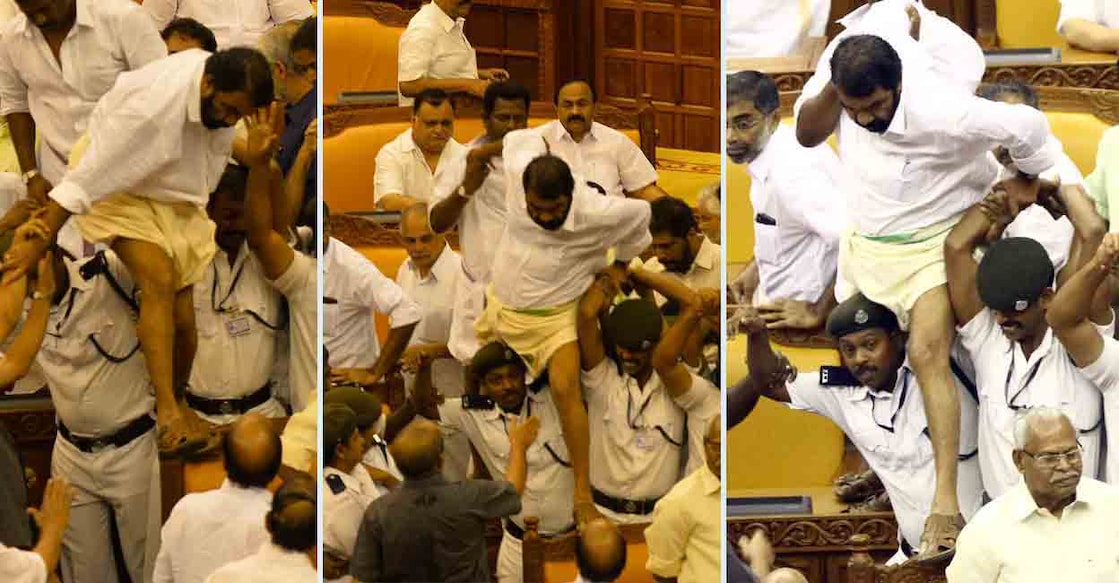Assembly ruckus case: Now action shifts to Thiruvananthapuram CJM court

Mail This Article
Thiruvananthapuram: The stage for the legal battle over the 2015 Kerala Legislative Assembly ruckus case will now shift to the Chief Judicial Magistrate court here after the Supreme Court refused to accept the state government's appeal not to proceed with criminal prosecution proceedings against the accused legislators.
The discharge petitions filed by the six accused, which are being heard by the CJM court, had come in the way of starting the prosecution proceedings in the case.
The case has been deferred for hearing on August 6.
Once the obstacles are removed for beginning the trial, the Chief Judicial Magistrate will issue summons to the accused after deciding the fresh date of hearing. The next step would be to read out the chargesheet to the accused.
The trial would begin once the accused refute charges against them.
The CPM is apprehensive because of the clear evidence of the vandalism which was shown live by the news channels and the harsh criticism made by the Supreme Court while dealing with the case.
There are also visuals recorded by the legislature secretriat. These visuals would prove crucial say legal experts.
Charges and likely punishment
The IPC sections slapped by the Crime Branch against the accused and the punishment liable under these sections are the following:
• IPC Section 447 deals with criminal trespass. Three months imprisonment, Rs 500 fine or both await the convicts.
• IPC 427 is on loss or damage to property worth Rs 50 or upwards. Imprisonment for a term which may extend to two years or with fine or with both ensues in case of conviction.
• Under Section 3(1) of the Prevention of Damage to Public Property Act, 1984 whoever committs mischief by doing any act in respect of any public property shall be punished with imprisonment for a term which may extend up to five years and with fine.
(Even if the three offences are proved and the accused found guilty, they will serve just a single sentence.)
Powers, privilege of legislators
Article 194 of the Constitution deals with the powers, privileges etc of the Houses of Legislatures and of their members and committees. Under it:
1. There shall be freedom of speech in the legislature in every state, subject to the provisions of this Constitution and to the rules and standing orders regulating the procedure of the legislature.
2. No member of the legislature or any commitee there of, and no person shall be so liable in respect of the publication by or under the authority of a House of such a legislature of any report, paper, votes proceedings.
Legal costs
After the 209 Periya twin murder case, it is for the Assembly ruckus case huge money is being spent from state exchequer for a legal battle.
Senior lawyer Ranjit Kumar had appeared for the state government in Supreme Court in the assembly ruckus case. Earlier, when Ranjit Kumar appeared in the High Court to oppose a CBI probe into the Periyar twin murder case, the government had paid the lawyer a whopping Rs 21.25 lakh. At that time he charged Rs 5 lakh for each appearance and Rs 1.25 lakh office expenses with total coming to Rs 6.25 lakh. Besides, the government was billed the air fare from Delhi to Kochi.
According to legal circles, his fee rises to upto Rs 11 lakh per day depending on the gravity of cases.
These details suggest that the government is spending a big sum from the state exchequer to fight the assembly ruckus case. However, the bills of the advocate have not reached the government yet.
In Peirya case, the state government had spent Rs 1 core as advocate fee.
When the government went for an appeal in the Supreme Court, it was again Ranjit Kumar who represented it.

